Current Programs
AMALIMA LOKO PROGRAM (2020 -2025)
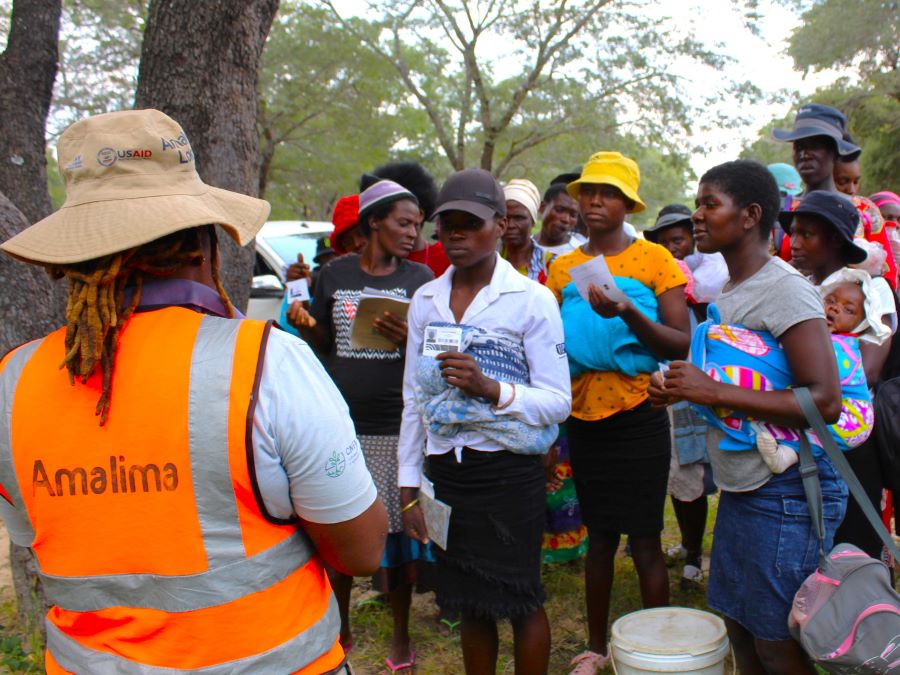
Amalima, the Ndebele word for a group of people coming together to achieve a common goal, and Loko meaning “genuine” or “authentic” in Tonga join to form Amalima Loko – a five-year (2020-2025) USAID funded Bureau of Humanitarian Assistance program designed to improve food security in Zimbabwe through increased food access and sustainable watershed management. Implemented by a consortium led by CNFA working with ORAP, IMC, Dabane Trust, The Mannof Group and Mercy Coorps, Amalima Loko builds on the legacy of its predecessor Amalima, a seven year Resilience Food Security Activity also implemented by CNFA that worked to sustainably improve food security and nutrition for vulnerable Zimbabwean households. The $75 million Amalima Loko program seeks to elevate the livelihoods of more than 67,000 vulnerable households across five districts of Zimbabwe’s Matabeleland North: Binga, Hwagne, Lupane, Nkayi, and Tsholotsho. To accomplish this, the program utilizes a unique Community Visioning approach designed to strengthen community and household-level resilience, promotes nutrition-sensitive initiatives including a blanket food distribution program, and improves watershed infrastructure and practices that provide long-term foundations for improved resilience and agriculture-based livelihoods.
Schools Feeding Program (2022 – ongoing)
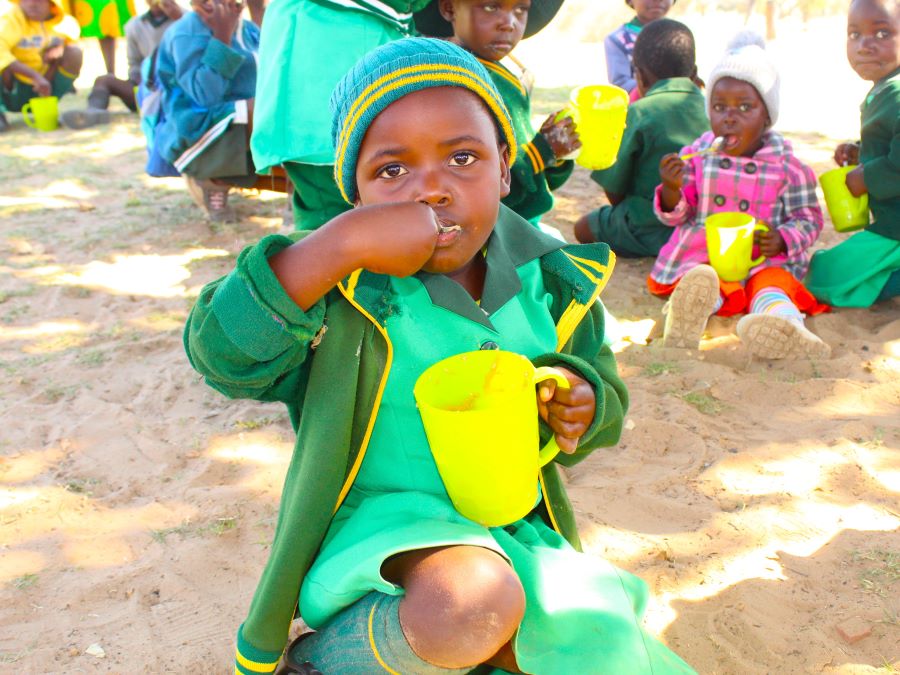
ORAP with support from Mary’s Meals International (MMI) and working in partnership with the Ministry of Primary and Secondary Education (MoPSE) is implementing a schools feeding program in Umguza and Bubi districts with plans of expanding to more districts. The program is currently reaching 104 schools with 30918 learners receiving a meal every day at their place of education. The programme is targeting primary school children with fortified Corn Soya Blend (CSB) prepared on site. The programme is community driven with parents and school authorities playing a pivotal role in ensuring that food preparation takes place everyday in schools. The testimonial feedback stories that we are getting are amazing and we are proud of the positive impact we are having on school children in terms of improvements in enrolments, attendance and concentration in class. These are important ingredients in improving various educational outcomes in schools.
Food Security and Habitat Protection (2021 – 2024)

ORAP in partnership with AGRITEX with support from World Wide Fund (WWF) is implementing a program aimed at promoting agroecology in Binga district under the Bengo GP – Food Security and Habitat Protection initiative in the KAZA Region. The project is working with 700 champion farmers from 5 wards (11, 12, 16, 17 & 21) to demonstrate climate smart agroecological practices that enhance sustainable food production in the drought prone area. The project has facilitated the establishment of 25 Farmer Field Schools (FFS) and 25 demo plots for demonstrating various agroecological practices like minimum tillage, use of organic manure, mulching, intercropping, crop rotation, weed and pest management, composting, early planting and planting of drought tolerant crop varieties. The project is also promoting agro-dealership as a means of making agro-inputs accessible to the farming community. Field days are conducted to facilitate cross learning and adoption of these agroecological practices. Farmers are greatly appreciating the importance and effectiveness of the practices by making comparisons. The FFSs and the field days will enhance the adoption of the agroecological practices and improve yields and ultimately contribute to food security in the district and beyond.
STRENGTHENING CIVIL SOCIETY THROUGH AN ORGANIZATIONAL DEVELOPMENT APPROACH PROJECT (2019 – 2023)

ORAP is one of the partners on the Zimbabwe module of the project: Strengthening Civil Society through an Organisational Development Approach” funded by BMZ through WWF. The project is a multi-country project involving Kenya, Madagascar, Zambia and Zimbabwe Below is an extract of the Zimbabwe component. The aim of the programme is to promote an active and effective civil society by strengthening the capacity of civil society actors, promoting participation and the representation of their interests and scaling, learning & exchange. Besides strengthening ORAP’s internal capacity in strategic planning and resource mobilisation, the project has strengthened the capacity of CBOs in Advocacy Waste Management and Entrepreneurship skills. It has also facilitated environmental dialogues with CBOs, traditional leadership, and government stakeholders in Tsholotsho to facilitate the review and implementation of local environmental by-laws to enhance the sustainable conservation and utilisation of natural resources.
EDUCATION (2005 – Ongoing)
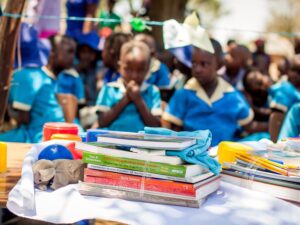
Over the past 15 years ORAP has worked with the US-Africa Children’s Fellowship (USACF) to improve education across Matabeleland region. School development has been our central focus with libraries being developed and stocked, sports education equipment being donated and early childhood development centres being set up. This has led to a greater reading culture emerging among students and community members who access the libraries. Pass rates have gone up and school sport teams are better equipped and play more competitively, resulting in stronger teams and better individuals.
ORAP believes that education is foundation to sustainable development and the communities we work with believe in this too. Our partnerships and projects want to enhance the investment that parents and communities at large make in sending their children to school. Our partners have contributed to improving school furniture and infrastructure, training teachers and School Development Committees and monitoring the impact of our projects overall.
SPORT (2014 – Ongoing)
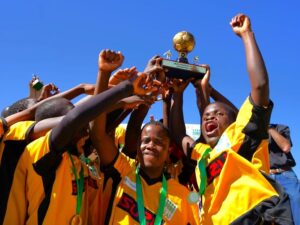
Since 2014 ORAP and AutoWorld Bulawayo have changed the face of sports development in Zimbabwe. An annual soccer tournament – The ORAP Zenzele Isuzu Champions Cup – has been organized around the One World Futbol (www.oneworldplayproject.com), a soccer ball designed to be very difficult to destroy. It is made with a specialized foam, related to the material used to make Crocs shoes, that allows the ball to re-inflate after being punctured. By distributing the balls ORAP and Autoworld have given thousands of children a chance to develop their ball skills, balance, agility, and overall physical development. They have also given young people an opportunity to participate in recreation and team development. The ORAP Zenzele Chevrolet Champions Cup is an under 20 tournament that began in 2014 when ORAP and Autoworld Bulawayo, who are the distributors of Isuzu, partnered to bring their dream of youth development through sport to life. The aim of the tournament is to provide youths more avenues and opportunities to excel, and also to bring together youths from different districts to share their experiences and ideas through the ORAP Development Dialogue model. The tournament is an example of the success that strategic partners bring to the world of development. Big soccer teams use this tournament as hunting ground for young untapped talent. Join us or donate towards this annual noble cause.
Lean Season Assistance (LSA) – Since 2002
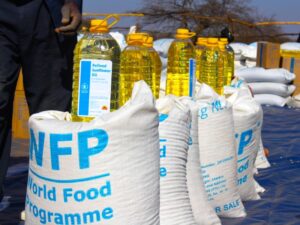
ORAP has, for the past two decades been partnering with the World Food Program (WFP) to ensure food security to vulnerable communities in districts in Matabeleland North and Matabeleland South. Through programmes such as FFA, NSART, VGF, CFA, LSA, the organization has distributed food, cash and vouchers to over 300,000 people, ensuring that they had adequate food during the lean season, thereby allowing children to continue attending school and protecting productive assets for the households. Leverage on its strong community mobilization background and good stakeholder relations and networks, infrastructure as well as an experienced humanitarian team. Of late, in line with government policy, food or cash aid has been coupled with resilience building complimentary activities with the aim of uplifting the communities and eliminating dependency syndrome. The intervention fulfills the Sustainable Development Goal (SDG) number two (2) “Zero hunger” by providing food assistance and facilitating activities that promote resilient food systems. By providing food relief to people; life with dignity is preserved or restored through the prevention of stress disposal of productive assets and reducing the prevalence of negative coping mechanisms.
Previous Programs
AMALIMA PROGRAM (2013 -2020)

The Amalima project was implemented by a consortium of local and international partners led by CNFA and composed of ORAP, Africare, Dabane Trust, the International Medical Corps (IMC) and the Manoff Group. The USAID funded project’s goal was to increase food and nutrition security through three strategic objectives 1: Improved household access to, and availability of, food; 2: Community resilience to shocks improved; and 3:Nutrition and health among pregnant and lactating females, boys and girls under 2 improved.
The seven year project worked with communities, government and private sector to sustainably improve food and nutrition security in Tsholotsho, Gwanda, Bulilima and Mangwe districts. The project reached over a 200 000 people with agriculture and livelihoods, resilience building as well as health and nutrition intervention. Amalima saw the development/rehabilitation of 33 sand abstraction systems, 13 irrigation schemes, 17 diptanks, 36 dams and 19 health centres across the 4 districts. Over 600 groups participated in VS&L (Qogelela) saving over US$900 000. Amalima reached over 120 000 women and children with supplementary feeding to reduce stunting levels. The project contributed to an overall 7.2% reduction in stunting in children under 5 years amongst many other achievements.
SIZIMELE (ARBZ) PROJECT (2017 – 2022)
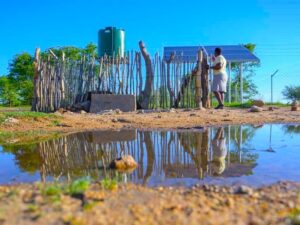
Sizimele Action for Building Resilience in Zimbabwe” is a multi-year project meant to build the resilience of 31,455 households in Insiza, Lupane and Matobo Districts. This project is implemented by a consortium led by DCA in partnership with ORAP, IRT, Pro Africa and TechnoServe. The consortium work actively to promote partnerships and collaboration with a range of actors including Community Based Organizations (CBOs), Local Authourities, government departments, the private sector and the academia.
The main objective of this project is to enable recovery and enhance the resilience of at risk smallholder farmers so that they are food, income and nutrition secure in the face of increasing multiple and chronic shocks and stressors. The project title Sizimele is a Ndebele term meaning ‘we are self-reliant’. The term encapsulates the Project’s fundamental premise of building lasting resilience capacities that ensure communities transition from poverty, move beyond mere survival, diversify income streams, achieve wellbeing outcomes and better withstand future shocks and stresses.
To date the project has succeeded in promoting a wide array of climate smart agricultural practices and technologies and ensuring diversified livelihoods across the operational districts. These include drilling and solarising boreholes, setting up marketing structures, automated weather stations, breed improvement, information centres, livestock fishing posts etc.
Bulawayo Urban Cash Transfers Assistance (Cash Transfers) 2019 – 2021
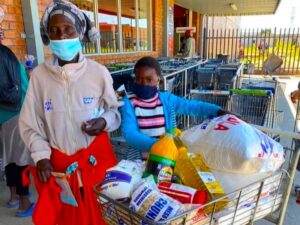
ORAP and DanChurchAid with funding from WFP are implementing an Urban Social Assistance project in Mzilikazi district of Bulawayo Metropolitan province in response to the rising urban poverty and vulnerability. The project is targeting over 35000 food insecure households and vulnerable at-risk population mainly living in the district’s hot spots. The project has so far reached out to over 36000 individuals with in 6 wards (7,8,12,13,19 & 21) of Mzilikazi district in Bulawayo. Each individual in a household is getting US$12 per month to supplement their food and other household needs. The project has two major components aimed at saving lives through monthly mobile cash transfers and domain specific-resilience building activities. The project is utilizing an E-Voucher system that is redeemable at various supermarkets in the city while about 5000 people receive their cash through Western Union. Over 2000 project beneficiaries have ventured into Village Savings and Lending (VS&L) and other entrepreneurship activities like detergent making, poultry, rabbit keeping, vending after receiving some starter packs.
Mzilikazi Multipurpose Cash Transfer (ECHO) 2020 – 2021

ORAP and DanChurchAid with funding from ECHO implemented a multipurpose cash transfer project in Mzilikazi district of Bulawayo Metropolitan province in response to the rising urban poverty and vulnerability. The project reached out to 20000 people with cash (US$12 per person per month) and some resilience building activities in 3 wards (9, 18 & 28) from June 2020 to March 2021. The project saw the establishment of 4 water kiosks in Pumula South, Magwegwe, Emganwini and Nketa 9 areas working with the Bulawayo City Council. Over 2000 project beneficiaries were trained in detergent making, Village Savings and lending (VS&L), sewing and tailoring as well as vending. The trainees were given grants to start their income generating activities as groups. Many detergents and sewing groups are currently thriving especially due to the high demand of detergents and masks caused by the COVID 19 pandemic.
Food, Nutrition and Income Security Enhancement Project (2017 – 2020)

ORAP in partnership with AGRITEX with support from World Wide Fund (WWF) implemented a Food, Nutrition and Income Security Enhancement Project in Tsholotsho district with the aim of promoting the adoption of sustainable agriculture practices by smallholder farmers in ecologically sensitive areas of Tsholotsho district in Matabeleland North Province. The initiative was part of a broader KAZA project whose objective was to contribute to increased and sustainable biodiversity management in Hwange National Park (HNP) and its buffer zones; and assist buffer communities to economically and sustainably benefit from natural resources. The project worked with 100 champion farmers from wards 1, 3 & 4 to demonstrate appropriate varieties of maize and sorghum as well as the necessary good climate smart agronomic practices that enhance productivity in the drought prone area. After a series of demonstration of various conservation techniques and seed varieties, farmer groups and the community through cross learning activities at large greatly appreciated the comparative advantage of small grains over maize in the area and the contribution of good agronomic practices in improving yields. Many farmers from the project scooped good accolades in the local and district agricultural shows coordinated by AGRITEX.
Promoting Recovery in Zimbabwe – PRIZE (2010 – 2013)
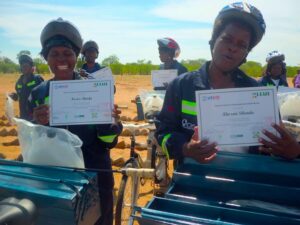
ORAP partnered with Catholic Relief Services as part of a larger consortium to implement the 3 year USAID funded PRIZE project in Matobo, Bulilima and Mangwe Districts from 2010 to 2013. The goal of the project was to reduce food insecurity for vulnerable individuals in 8 districts of Zimbabwe. The project focused on addressing urgent food needs of vulnerable households in the short-term while laying the foundation for long-term food security. PRIZE collaborated with Ministry of Agriculture, Drought Relief Committees, EMA, Social Services Department and other key stakeholders to reach out to over 150 000 individuals. Interventions included building farmer knowledge and skills in crops and livestock production, strengthening market linkages, community managed disaster risk reduction, Village Savings and Lending (VS&L), Food for Assets as well as productive asset creation and rehabilitation.